Swedish Soprum and recycling Posted by Katja on Sep 26, 2012 in Culture, Living in Sweden
Have you ever entered a garbage room in Sweden? If you have did you find it logical or just plain confusing? There actually is a really good set-up for it, with different containers for the different materials you are supposed to sort out and recycle. The main different types being; cardboard, paper (newspapers), plastic, metal, compost and batteries.
To make things easier for people and to encourage them to actually compost, many municipalities provide brown compost paper bags for people to use for free.
Since the garbage collection is run by the municipality people have to pay a fee (either included or excluded in their rent) for garbage collection.
Almost all of the paid income tax goes straight to the municipalities. In exchange it is their responsibility to provide healthcare, education, garbage removal etc. The municipality usually employes different companies to do this. In most cases around Sweden ( if not all ) there are recycling containers in the nearby vicinity and it is not uncommon to have a garbage room in the same or next door building.
Here come some pictures of what the containers look like, in case you want to try out the whole recycling experience.
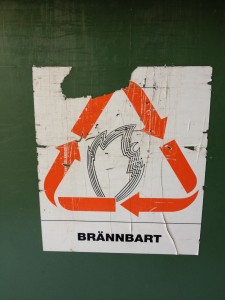 This is the container for the “normal garbage” ie. Everything that can’t be separated into all the other containers. Brännbart means burnable.
This is the container for the “normal garbage” ie. Everything that can’t be separated into all the other containers. Brännbart means burnable.
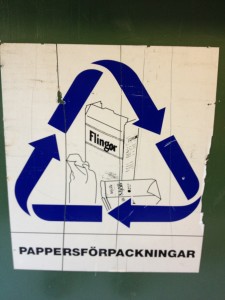 This is the container for cardboard, hard paper and newspapers. Pappersförpackningar means paper containers.
This is the container for cardboard, hard paper and newspapers. Pappersförpackningar means paper containers.
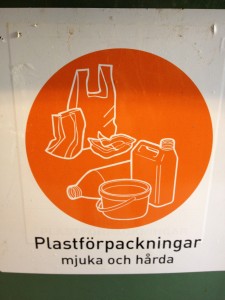 This is the container for both hard and soft plastic. Plastförpackningar means plastic containters. Hård means hard and mjuk means soft.
This is the container for both hard and soft plastic. Plastförpackningar means plastic containters. Hård means hard and mjuk means soft.
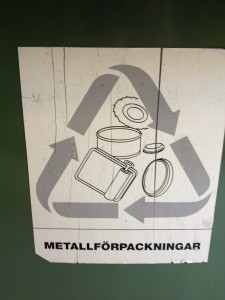 As you by now might have guessed förpackningar means packaging/containers, so this time it is for metal.
As you by now might have guessed förpackningar means packaging/containers, so this time it is for metal.
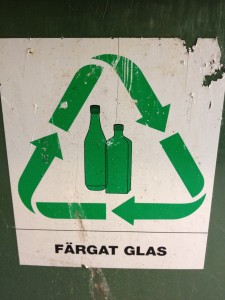 Färgat glas means colored glass.
Färgat glas means colored glass.
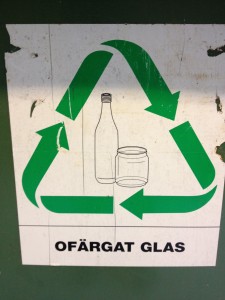 So this one must mean uncolored glass.
So this one must mean uncolored glass.
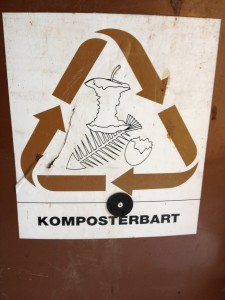 Komposterbart means that it is compostable!! Woopie! Though you shouldn’t put lemons, limes or banana peels in here since they take such a long time to disintegrate.
Komposterbart means that it is compostable!! Woopie! Though you shouldn’t put lemons, limes or banana peels in here since they take such a long time to disintegrate.
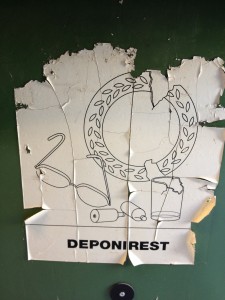 Deponirest can be translated as “Landfill waste”, meaning that it can’t be recycled, burned or reused. So it gets collected and used as a “filler” on some garbage tips, depending on the location. Things that get recycled here are usually made up out of several different materials, making it hard to recycle because they are hard to separate.
Deponirest can be translated as “Landfill waste”, meaning that it can’t be recycled, burned or reused. So it gets collected and used as a “filler” on some garbage tips, depending on the location. Things that get recycled here are usually made up out of several different materials, making it hard to recycle because they are hard to separate.
Here come some uplifting facts about recycling in Sweden: (The facts are according to a Swedish site which was made to help the public understand how Sweden takes care of it’s garbage. Check the site out here)
- Sweden recycles the most electronic waste / capita in the world.
- About half of the waste that gets taken to the tip gets recycled in Sweden.
- 99% of all the 33cl bottles which have a deposit on them get recycled.
- 75% of all packaging gets recycled.
- Swedish recycling saves 6,2 million tons of CO2 emissions.
- If you recycle your newspaper then with the saved energy you can make 38 cups of coffee.
- Every third paper bag at supermarkets in Sweden are made from recycled paper.
- Sweden recycles 98% of it’s household waste.
- If everybody recycled their bottle caps there would be enough steel to make 200 cars /year. (That is if we wanted to continue making more cars).
- Half of all the steel used in the world today comes from recycled iron.
Don’t you just feel inspired to start recycling, if you haven’t been doing so already?
Is Sweden is world leading when it comes to recycling do you think? Do you know of any other countries which have developed their recycling systems to an ever greater extent than Sweden? If you do, please share. Recycling is actually a subject talked a lot about in Sweden. It symbolizes what simple things can be done for the environment at the level of the individual.

Build vocabulary, practice pronunciation, and more with Transparent Language Online. Available anytime, anywhere, on any device.




Comments:
cardboard balers:
Of course, recycling paper means fewer trees are needed to produce new paper. Recycling one ton of paper saves one ton of trees. That means that for every ton of used cards recycled, seventeen mature trees are saved from being felled.